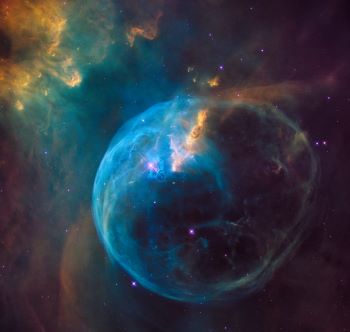Is existence merely a pimple on the face of non-existence?
02/11/2022 Category: Science/Philosophy

The great Julian Huxley once stated he believed we would someday solve the mystery of existence. However, that's not so certain.
How did existence get here? People have long asked the question where did God come from? Church leaders have long answered that God has always existed. That response seems like something of a cop out but really, it might not be depending on your definition of 'always'.
Let's consider the alternative to existence, which is non-existence or the complete absence of existence. That's a difficult concept to get your head around. However, with a bit of practice we can do it to at least some degree. Try to imagine that existence doesn't exist. There's no universe, no space-time, nothing external to spacetime, nothing whatsoever. Even God doesn't exist. Absolute nothingness. Once we have gained some concept of that, we must then ask ourselves how existence came about.
At this point we come face to face with the fact that our intellects are probably equivalent to that of an amoeba compared to whoever or whatever created the universe and anything beyond it that exists. After all, we are still just beginning to understand the space-time bubble that we are a feature of. We make new discoveries every day, many of which we don't completely understand. For example, we have observed the phenomenon of entanglement, but we can't explain the force or influence that is responsible for it.
It's a reasonable assumption that intelligence of some sort is responsible for creating the universe. When we read about what astrophysicists believe particles did immediately following the big bang, it's clear they behaved in an orderly fashion. They, or something controlling them, made order out of chaos. We know from our own wide experience that the application of intelligence creates order and lack of it brings chaos. However, what we perceive as intelligence may be just a single aspect of something vastly more complex.
Trapped within our space-time bubble we observe that everything we can detect is the result of cause and effect. Science considers that there can be no effect without a cause. That's a problem when we're trying to work out how existence got here. If there was no existence to begin with, how could there be a cause?
That leaves us with two options according to our feeble understanding. One is that the rules outside our bubble, or more correctly, not within our bubble, are different. The conclusion in terms of our ability to comprehend, is that existence occurred spontaneously. It popped up suddenly, just like a pimple in the night on beautiful face.
That sounds impossible to our tiny pea brains. We are incapable of fully comprehending the universe and the nature of existence, so the other possibility is that something we just don't understand created existence. Outside our time space bubble, entities might simply appear or disappear without any provocation or due to some effect or quality of non-existence that we're simply incapable of understanding.
What this all points to ultimately is that our understanding of existence is faulty. Our drawing of a sharp dichotomy between existence and non-existence may be woefully inaccurate. There may be alternatives to the entire concept of existence/non-existence that our existence dimension is merely a subset of.
Perhaps we are best looked at as the equivalent of goldfish in a bowl that knows nothing of the world outside their own little bubble. We may never come to understand the nature of existence because we simply don't have the intellect.
Photo by NASA on Unsplash
- - ArgueGuru - -
